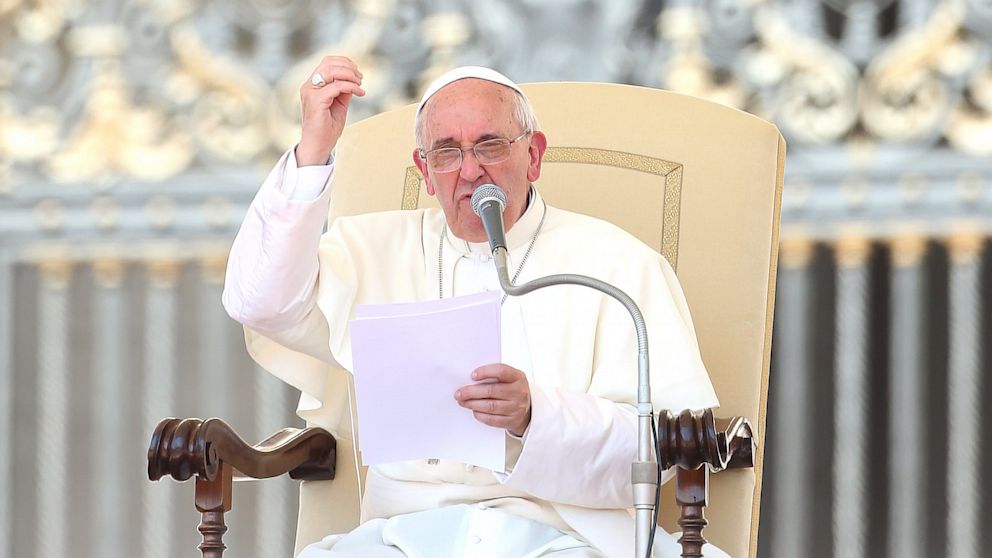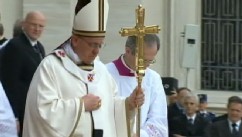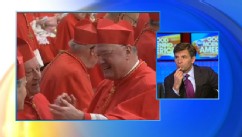When people think of the Vatican and World War II, they think immediately of Pius XII, the controversial pontiff between 1939 and 1958. But before him, there was a little-remembered pope, Pope Pius XI, who was loudly outspoken against the Nazis and was determined to call the world's attention to their atrocities. "The Pope's Last Crusade" tells that story, along with that of the pope's partnership with an American Jesuit, which breaks new ground about war-time conspiracies within the Vatican.
Pope Pius XI had left the Vatican in late April 1938, earlier than usual for his summer retreat at Castel Gandolfo. He intended it to be an obvious snub directed at Adolf Hitler who was meeting the first week in May with Italian leader Benito Mussolini.
The pope rejected being present while the "crooked cross of neo-paganism" flew over Rome. Hitler's anti-Semitic campaign had become the pope's great preoccupation.
Many scholars think that Pius XI's crusade against Hitler, which took place in the last months of his life, could have changed course of events, possibly even the severity of later atrocities against the Jews.
As the Nazis increased their threats in their march toward war, the pope realized that it might at that moment be the Jews, but then it would be the Catholics and finally the world. He could see that the Nazis would stop at nothing less than world domination.
Pius had few allies at the Vatican, where many even believed that Communism was a greater danger than Fascism. Therefore, many prelates thought, the enemy of their Communist enemy must be their friend.
But Pius saw Hitler as an insane presence in the world and had been searching for a means of applying pressure and rallying international leaders against Nazism. It would not be easy. He was 82 years old and increasingly ill. At the same time, powerful cardinals and bishops around him feared the pope's activism against Hitler. In particular, the Vatican secretary of state, Cardinal Eugenio Pacelli, counseled caution in challenging Hitler and Mussolini. Pacelli eventually would eventually succeed Pius XI.
The pope, undeterred, reached out for help beyond the walls of the Vatican, seeking out an American Jesuit journalist, John LaFarge, who had just come to Italy. LaFarge had just written a book, "Interracial Justice," which portrayed the lives of American blacks who lived in the poorest strata of society. While LaFarge defended African Americans against the myth of racial superiority, the concept applies, he wrote, "to all races and conditions of men ... all tribes and races, Jew and Gentile alike..." (Twenty-five years later, in 1963, LaFarge stood with his friend Martin Luther King at the March on Washington.)
The pope summoned LaFarge to Castel Gandolfo on June 25, 1938. The American priest was shocked that the pope even knew his name. Pius told LaFarge he was to write an encyclical that would use the same reasoning he employed when discussing racism in the United States. It was to be the strongest statement ever made by the Vatican, in defense of the Jews and rejecting the Nazi doctrine of anti-Semitism.
Sworn to silence, LaFarge took up the papal assignment clandestinely in Paris. The pope's directive, however, had thrown LaFarge into the hazy realm of Vatican politics. The leader of the Jesuit order worldwide, Wlodimir Ledochowski, promised the pope and LaFarge that he would facilitate production of the encyclical. Privately, Ledochowski, an anti-Semite, conspired to block LaFarge at every turn.
In late September 1938, after about three months of work, LaFarge traveled to Rome with his papal mission complete. His superior, Ledochowski, welcomed him and promised to deliver the encyclical right away to the pope. He dismissed LaFarge and directed him to return home to the United States. Ledochowski did take care of the speech -- by burying it for months in Vatican bureaucracy.
The pontiff, unaware of these machinations, was stepping up his criticism of the Hitler, and Mussolini. He criticized Mussolini's imitation of systematic attacks on Jews in Germany and Austria. As in Germany, Jews in Italy were banned from attending school, from holding public positions or serving as doctors, lawyers and in other professional functions. Pius XI condemned these actions.
"Spiritually," the pope said, "we are all Semites."
In the fall of 1938, LaFarge realized finally that the pope still had not received the encyclical. He wrote a letter directly to the pope, implying that Ledochowski had the document in hand for months already. Pius XI demanded delivery, but did not receive it until Jan. 21, 1939 with a note from Ledochowski, who warned that the language of the document appeared to be excessive. He advised caution.
The pope, finally with LaFarge's text, planned immediately to issue the encyclical after a meeting with bishops on Feb. 11, in which he would condemn fascism. He worked on that speech on his own, jotting down ideas, rewriting and editing it by hand. Rumors, meanwhile, had reached Mussolini that the pope might be planning to excommunicate him or even Hitler, also a Catholic, a blow that could actually damage their popular power base.
Pius XI died on Feb. 10, 1939, a day before his planned speech. Vatican doctors said he had suffered complications of a heart attack, and despite administering stimulants, they had been unable to revive him.
Bishops in some quarters grumbled about the circumstances of his death and questioned the kind of stimulants he had been given in an attempt to revive him. Cardinal Eugene Tisserant of France, the pope's best friend and a former French intelligence officer, wrote in his diary that the pope had been murdered.
Pacelli, the secretary of state, became Pius XII, and the Vatican immediately toned down its vocal protests against Hitler and Mussolini. One historian, Conor Cruise O'Brien, the noted Irish writer and politician, in 1989 said that those months in 1938 were crucial as Hitler measured how the world would react to his campaign against the Jews.
"Had Pius XI been able to deliver the encyclical he planned, the green light would have changed to red. The Catholic Church in Germany would have been obliged to speak out against the persecution of the Jews. Many Protestants, inside and outside Germany, would have likely to follow its example."
How effective Pius XI's efforts might have been can never be known. It was only clear that he took a stance in favor of absolute morality and defended to his last breath his principles of decency and humanity, nothing more, nothing less.
....
Taken from:
http://www.huffingtonpost.com/peter-eisner/popes-last-crusade_b_3071556.html








